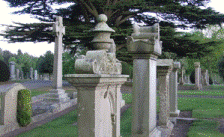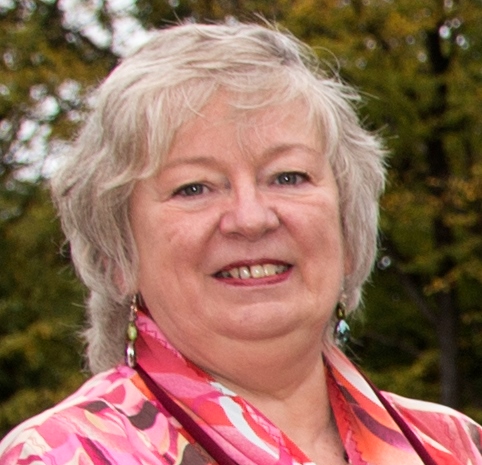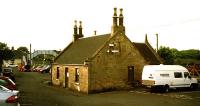- Birth*: Hugh Conn Reid railway worker; Provost of Kilwinning was born on 24 July 1873 at Kilwinning, Ayrshire, Scotland,
 ; twin.1
; twin.1 - (Groom) Marriage*: He married Amelia Louise Wightman, daughter of Alexander Wightman and Annie Elizabeth McGuinness, on 1 June 1914 at Londonderry, Northern Ireland,
 .1
.1 - (Deceased) Death*: Hugh Conn Reid railway worker; Provost of Kilwinning died on 13 June 1954 at Parkhead House, 49 Byres Road, Kilwinning, Ayrshire, Scotland,
 , at age 80 from Lee Whalmsley Sept 2007.
, at age 80 from Lee Whalmsley Sept 2007. - (Witness) Residence: Hugh Conn Reid railway worker; Provost of Kilwinning lived at Kilwinning, Ayrshire, Scotland,
 ; Kilwinning is described in a directory published by Pigot & Co in 1837 as … an ancient and thriving little manufacturing town … 24 miles from Glasgow, 3 nw of Irvine, 4 ne of Saltcoats, the like distance s of Dalry, 10 nw of Kilmarnock and 5 from Ardrossan; situate on rising ground about 2 miles from the sea; stretching westward from the right bank of the Garnock, and approached through long ambrageous paths, skirted by beautiful fields. It consists chiefly of one street and bye-lanes, with a few rows of modern houses. The weaving and manufacture of gauzes, muslins, shawls, etc are carried on, to an important extent, for the Glasgow and Paisley markets, to which they are conveyed by the local agents. The agricultural produce of the parish is likewise considerable; and coals, which are obtained in abundance, are conveyed by a railway passing from east to west across the parish. …
; Kilwinning is described in a directory published by Pigot & Co in 1837 as … an ancient and thriving little manufacturing town … 24 miles from Glasgow, 3 nw of Irvine, 4 ne of Saltcoats, the like distance s of Dalry, 10 nw of Kilmarnock and 5 from Ardrossan; situate on rising ground about 2 miles from the sea; stretching westward from the right bank of the Garnock, and approached through long ambrageous paths, skirted by beautiful fields. It consists chiefly of one street and bye-lanes, with a few rows of modern houses. The weaving and manufacture of gauzes, muslins, shawls, etc are carried on, to an important extent, for the Glasgow and Paisley markets, to which they are conveyed by the local agents. The agricultural produce of the parish is likewise considerable; and coals, which are obtained in abundance, are conveyed by a railway passing from east to west across the parish. …
Kilwinning was the first place in Scotland where free masonry was established; it is said to have been introduced by the foreign architect who was employed in erecting the monastery here. The abbey is thought to have been built about 1140. Briefly, free masonry is accepted as having been born out of the guilds of craftsmen of the middle ages, in particular the masons. A mason often had to travel the length of the county to seek work. He had to prove his rank and ability to his prospective employer. This he did by showing that he was in possession of certain secrets that he had learnt from his guild.
The Statistical Account written by the Rev. Archibald Blair Campbell in April 1842 describes Kilwinning in great ecclesiastical detail, but includes gems such as (describing the population of around 630 families in the town): There are three individuals deaf and dumb in the parish, two fatuous, and two blind. … There is no smuggling. Poaching is carried on to a small extent. He continues: The male inhabitants of Kilwinning are chiefly employed in weaving and mining; the females in sewing. The only individuals found necessary for keeping the peace are one of the county police and a sheriff-officer. … Formerly there were several stagecoaches, which passed through Kilwinning to Glasgow and other places, but they have all given up since the opening of the Glasgow and Ayr Railway, about two years ago, which affords the greatest facilities, both for travelling and the conveyance of goods, and farm produce.
He is highly critical of the 27 licensed Inns or Alehouses in the parish – Their effect on the morals of the people, especially the miners and inhabitants of the town, is of the most pernicious description. In his conclusion he observes The inhabitants are, we believe, more industrious than they were towards the end of last century; but they are more extravagant both in regard to their clothing and mode of living, and it is to be feared, less contented with their circumstances. … The desire for luxuries is, in many instances, too prevalent, and a want of prudence, foresight, and economy, often appears. The inhabitants of the parish, in general, are intelligent and well informed, and many of them are exemplary in the discharge of all the duties of their station.2,3 - [S40] LW [Sept 2007].
- [S49] Website Web Site online (www.) http://www.ayrshireroots.com/Towns/Kilwinning/Kilwinning%201837.htm
- [S49] Website Web Site online (www.) http://stat-acc-scot.edina.ac.uk/sas/sas.asp/?monospace=&twoup=&nohighlight=&account=2&transcript=&session-id=0e6ad3fbea8061a21f0cb372871b1e9b&naecache=5&accountrec=4685&navbar=&action=publicdisplay&parish=Kilwinning&county=Ayrshire&pagesize=
Hugh Conn Reid railway worker; Provost of Kilwinning
M, #3978, b. 24 July 1873, d. 13 June 1954
Last Edited: 26 May 2024
 Genes on the Web
Genes on the Web
